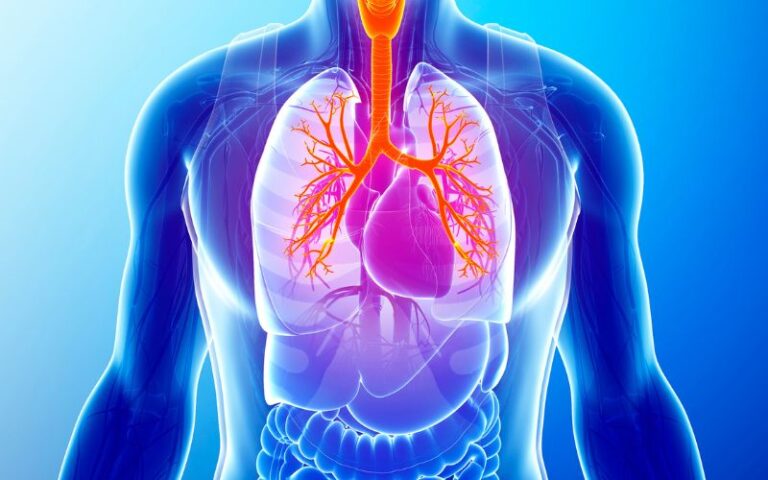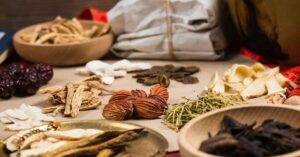In a world where air pollution and respiratory illnesses are becoming prevalent, the importance of healthy lungs can’t be emphasized enough.
Traditional Chinese Medicine (TCM) offers a holistic approach to lung health, focusing not just on treating symptoms but also on preventing illnesses.
With natural remedies and therapies rooted in ancient wisdom, TCM has stood the test of time in promoting lung health and improving overall well-being.
Using a combination of acupuncture, herbal medicine, and breathing exercises, Traditional Chinese Medicine aims to rebalance the body’s energy, known as Qi, and enhance lung function.
Understanding The Importance of Healthy Lungs in TCM

In Traditional Chinese Medicine, the lungs are considered to be of vital importance as they play a primary function in the body’s respiratory system.
The lung Qi, or energy, is responsible for circulating oxygen throughout the body and removing carbon dioxide.
Weak lungs can lead to a wide range of respiratory symptoms such as chronic cough, shortness of breath, and susceptibility to respiratory infections.
Chinese medicine practitioners believe that factors such as emotional stress, poor diet, and environmental toxins can weaken the lungs.
Through the application of TCM techniques, people can enhance their general health and fortify their lung function.
Herbal remedies have long been used in Traditional Chinese Medicine to treat respiratory conditions such as asthma, bronchitis, and allergies.
These natural remedies work to nourish the lungs, reduce inflammation, and clear phlegm, helping to alleviate symptoms and improve lung function.
Traditional Chinese Medicine Practices for Promoting Lung Health

One common practice in Traditional Chinese Medicine is acupuncture, which involves inserting thin needles into specific points on the body to stimulate energy flow and promote healing.
Acupuncture can help improve lung function by reducing inflammation, clearing blockages, and enhancing circulation.
Herbal medicine is another key component of Traditional Chinese Medicine that can benefit lung health.
Chinese herbs such as ginseng, licorice root, and astragalus have been traditionally used to strengthen the lungs, boost immunity, and reduce respiratory symptoms.
These herbs work synergistically to address underlying imbalances and support overall lung health.
Breathing exercises are also an integral part of Traditional Chinese Medicine practices for promoting lung health. Techniques such as Tai Chi and Qi Gong focus on deep breathing, relaxation, and movement to improve lung capacity and strengthen respiratory muscles.
QiGong Exercises for Strengthening The Lungs

QiGong exercises are a fundamental component of Traditional Chinese Medicine practices aimed at promoting lung health.
These gentle movements and deep breathing techniques focus on cultivating Qi, or energy, within the body to strengthen the lungs and improve respiratory function.
One popular QiGong exercise for lung health is “Dragon Breathing,” which involves slow, deep breaths that expand the lungs and increase oxygen intake.
This exercise helps to increase lung capacity, improve circulation, and clear stagnation in the respiratory system.
Another beneficial QiGong exercise for strengthening the lungs is “White Tiger Stretches Its Claws.”
This movement involves stretching the arms overhead while taking deep breaths to open up the chest and expand lung capacity.
By practicing this exercise regularly, individuals can enhance their lung function and promote overall respiratory health.
Dietary Recommendations for Lung Health in Traditional Chinese Medicine

Dietary recommendations play a crucial role in Traditional Chinese Medicine practices for promoting lung health.
In TCM, food is seen as a form of medicine that can either support or weaken the body’s overall health and vitality.
To nourish the lungs and promote optimal respiratory function, Traditional Chinese Medicine practitioners recommend consuming foods that are moistening, cooling, and beneficial for lung Qi.
Some key dietary guidelines for lung health in Traditional Chinese Medicine include:
- Incorporating pungent and spicy foods: Foods such as garlic, ginger, onions, and peppers are believed to have warming properties that can help disperse lung Qi and promote circulation in the respiratory system.
- Eating foods that moisten the lungs: Lung dryness is a common issue in TCM that can lead to symptoms such as a dry cough and difficulty breathing. To counteract this, TCM practitioners recommend consuming foods such as pears, honey, almonds, and lily bulbs that are moistening in nature and help to nourish the lungs.
- Avoiding excessive consumption of dairy products: In TCM, dairy products are believed to create phlegm and dampness in the body, which can impair lung function. Limiting the intake of dairy foods such as milk, cheese, and yogurt can help prevent respiratory issues.
- Incorporating lung-strengthening herbs into meals: Herbs such as thyme, oregano, and basil have been traditionally used in TCM to support lung health. Adding these herbs to soups, stews, and stir-fries can help strengthen the lungs and promote respiratory wellness.
Incorporating TCM Practices into Your Daily Routine
Incorporating Traditional Chinese Medicine (TCM) practices into your daily routine can help promote healthy lungs and overall respiratory function.
Here are some simple ways to integrate Traditional Chinese Medicine principles into your daily life:
Start Your Day with Breathing Exercises
Begin each morning with a few minutes of deep breathing exercises to help expand your lung capacity and improve respiratory function.
Incorporate techniques such as Dragon Breathing or White Tiger Stretches Its Claws to enhance lung strength and vitality.
Include Lung-Strengthening Herbs in Your Meals
Incorporate herbs known for their lung-nourishing properties, such as thyme, oregano, and basil, into your cooking.
Add these herbs to soups, stews, and stir-fries to help support lung health and promote respiratory wellness.
Practice QiGong Exercises
Incorporate gentle movement and deep breathing techniques such as QiGong into your daily routine to cultivate Qi, strengthen the lungs, and improve respiratory function.
Regular practice of these exercises can help enhance lung capacity and circulation in the respiratory system.
Stay Hydrated
Drink plenty of water throughout the day to keep your lungs moist and prevent dryness.
Adequate hydration is essential for maintaining optimal respiratory function and supporting overall lung health.
Consult with a TCM Practitioner
If you are experiencing chronic cough, respiratory infections, or other respiratory symptoms, consider consulting with a Traditional Chinese Medicine practitioner.
They can provide personalized recommendations for promoting healthy lungs through herbal medicine, dietary changes, and other TCM therapies.
Conclusion
In conclusion, Traditional Chinese Medicine offers a holistic approach to promoting healthy lungs and respiratory function through the use of food, herbs, and practices that support lung Qi and nourish the lungs.
You can support optimal respiratory health by incorporating TCM principles into your daily routine, such as consuming lung-nourishing foods, practicing breathing exercises, incorporating lung-strengthening herbs into meals, and staying hydrated.
It is important to remember that TCM should be used in conjunction with Western medicine for comprehensive care.
While Traditional Chinese Medicine can play a significant role in promoting lung health, it is essential to consult with healthcare professionals for the proper diagnosis and treatment of any respiratory issues.
By combining the power of Traditional Chinese Medicine with conventional medical treatments, individuals can take a proactive approach to maintaining healthy lungs and overall respiratory wellness.
Remember, prevention is always better than cure, so start incorporating these TCM practices into your daily routine today for optimal lung health.
Start your Wellness Journey with Lau of Natural Healing TCM Wellness Classes
Lau of Natural Healing offers Traditional Chinese Medicine wellness classes that focus on promoting lung health through holistic practices, such as QiGong exercises, breathing techniques, and herbal remedies.
By enrolling in our wellness classes, individuals can learn how to incorporate TCM principles into their daily lives to strengthen the lungs, improve respiratory function, and enhance overall well-being.
With the help of Lau of Natural Healing TCM, participants can develop a deeper understanding of the importance of lung health and how to support it through natural healing methods.
Take the first step towards optimal lung health by enrolling in Lau of Natural Healing TCM Wellness Classes today and start your journey towards better respiratory function and well-being.
Your lungs will thank you!
FAQs
Traditional Chinese Medicine can be used as a complementary therapy to conventional treatments for chronic lung conditions like asthma or COPD. TCM practices such as herbal medicine, acupuncture, and breathing exercises can help support respiratory function and overall lung health.
While Traditional Chinese Medicine is generally safe when administered by a qualified practitioner, it is essential to consult with your healthcare provider before incorporating TCM into your routine. Some herbs or treatments may interact with medications or have adverse reactions in certain individuals.
The timeline for seeing results when using TCM for lung health can vary depending on the individual and their specific condition. Some people may experience improvements in respiratory symptoms relatively quickly, while others may require more time for noticeable changes. Consistency in following TCM recommendations and practices is key to seeing long-term benefits for lung health.








